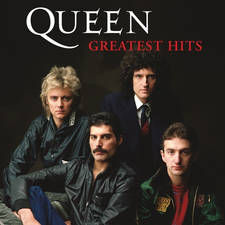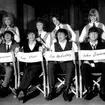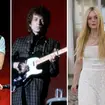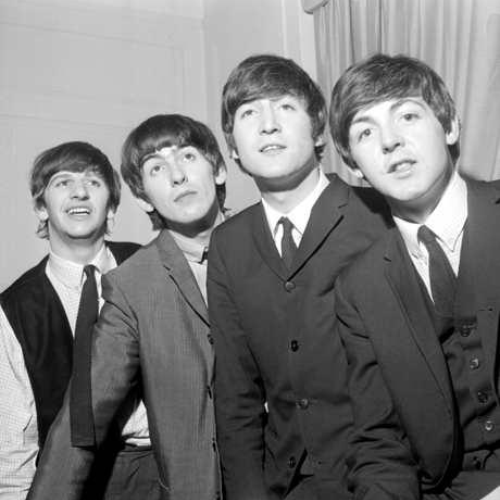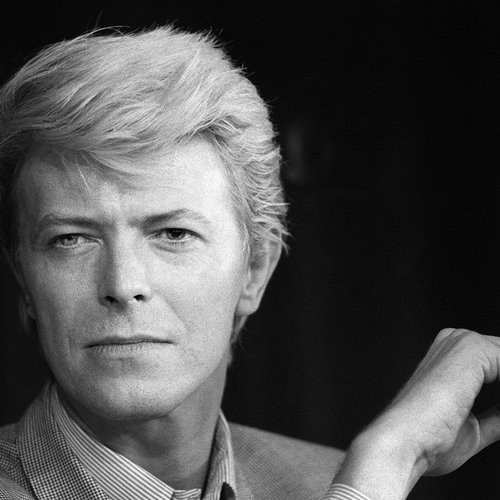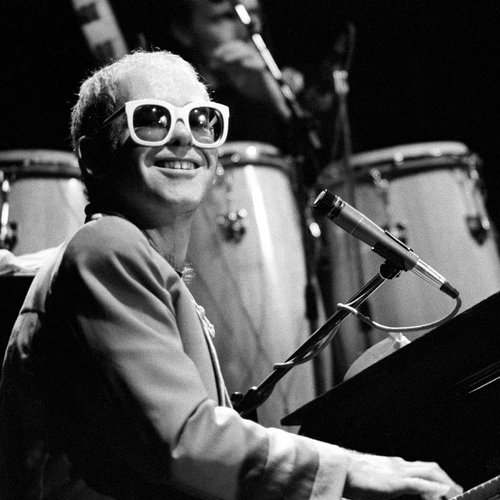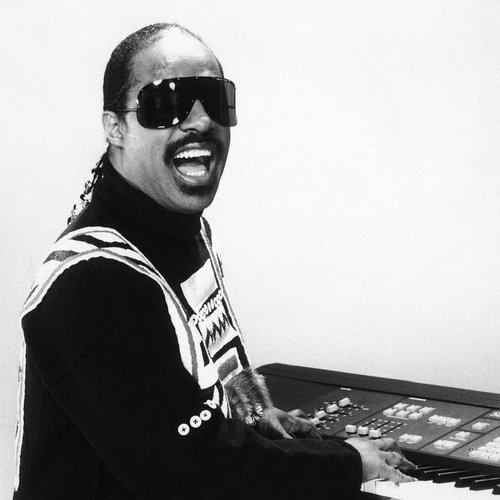'Free as a Bird' and 'Real Love': The story of the previous "new" Beatles songs
3 November 2023, 12:29 | Updated: 12 April 2024, 10:16

The Beatles – Anthology ABC TV trailer
All the fuss around The Beatles final "new" song 'Now and Then' reminds us of the two that came before.
Listen to this article
The Beatles are rightly regarded as one of the greatest bands in the history of popular music, if not the greatest full stop.
The global fuss over their final song 'Now and Then' is a testament to just how loved they are, over half a century after they parted ways.
- New Beatles song 'Now and Then': The 'final' Beatles track with John Lennon explained
- The Beatles: What's the difference between the new Red and Blue albums and the classic originals?
- Listen to the Gold 60s Live Playlist on Global Player
As well as their incredible songs and undeniable cultural importance, one of the reasons the band has remained so adored is that rather than limp on for years and years, they stopped at their very peak, or certainly not far off it.
But over the years, there have been sort-of-reunions, the most striking of which led to the creation of 'Free as a Bird', 'Real Love' and, eventually 'Now and Then'.
Did The Beatles ever reform after they split in 1970?

God (Remastered 2010)
After the band split in 1970, there was never any complete reunion of the Fab Four.
John Lennon worked with Ringo Starr and George Harrison as early as the Plastic Ono Band albums in the year of the split (Ringo's drumming is all over the record), while George and Ringo hooked up loads in the first half of the decade.
Ringo's self-titled 1973 album featured all four of The Beatles, in fact, but not at the same time.

I'm The Greatest
Lennon wrote 'I'm The Greatest', which featured Ringo, John, George and Beatles associates Billy Preston and Klaus Voormann, while Paul 'n' Linda wrote and appeared on 'Six O'Clock').
In 1980, John Lennon was tragically murdered, which meant that despite a thawing of the relationship between him and Paul, all hopes of a complete Beatles reunion at any point in the future were completely dashed.
Well, not completely. In the pipeline since the split, 1995 saw the long, long-awaited release of Anthology.
How did the "Threetles" reunite with John Lennon from beyond the grave to make 'Free as a Bird' and 'Real Love'?
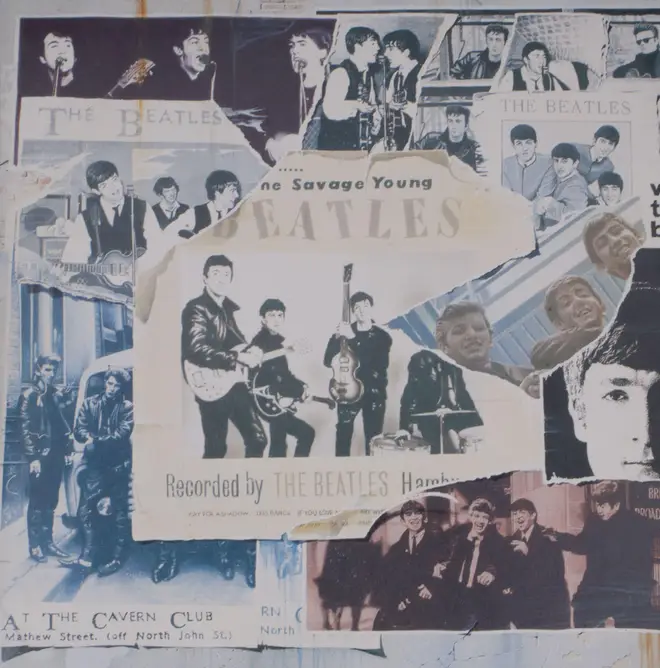
Anthology was multimedia project, including a trio of double albums, a chunky hardback book, and at its centre, a stunning eight-episode TV series that told the full story of the band from its heady beginning to the very end.
The timing was just right. There was enough water under the bridge to convince Paul, Ringo and an often reluctant George (and a consenting Yoko) to get back together, while the Britpop scene of the moment was constantly invoking The Beatles in both interviews and music.
And as well as looking back, the band even made something new (or at least, new-ish). After originally thinking they would record some instrumental music as a trio, they then decided that each of the three Anthology albums should have a "new" Beatles song – featuring all four members including Lennon.
So, Paul McCartney, Starr and Harrison reached out to Yoko to ask if she had any unreleased music of John's she could give the trio.

Free as a bird (John Lennon)
Yoko has said that it was Harrison and ex-Beatles road manager Neil Aspinall who asked her about the idea of adding new music to John's old tapes, while she handed them over after John Lennon's second, solo induction into the Rock and Roll Hall of Fame in 1994.
Paul went over to Yoko's house after the ceremony where he listened to a cassette tape that included five or six songs, with The Beatles deciding to focus on four: 'Free As A Bird', 'Real Love', 'Grow Old With Me' (which had appeared on 1984's posthumous Lennon/Ono album Milk & Honey) and 'Now and Then'.
"She was there with Sean," Paul later told Q magazine. "She played us a couple of tracks. There were two newies on mono cassettes which he did at home... I checked it out with Sean, because I didn't want him to have a problem with it.

The Beatles - Free As A Bird
"He said, 'Well, it'll be weird hearing a dead guy on lead vocal. But give it a try'. I said to them both, 'If it doesn't work out, you can veto it'."
He added: "When I told George and Ringo I'd agreed to that they were going, 'What? What if we love it?'. It didn't come to that, luckily.
"I said to Yoko, 'Don't impose too many conditions on us, it's really difficult to do this, spiritually. We don't know, we may hate each other after two hours in the studio and just walk out. So don't put any conditions, it's tough enough'."
Who produced 'Free as a Bird' and 'Real Love'?
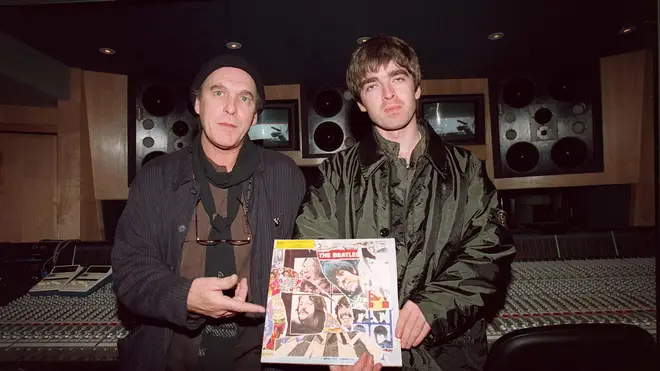
With the tape of John's demos in hand, the surviving Beatles got in the studio and got to work.
George Martin was approached to produce the song, but declined, claiming that his hearing issues would make it impossible (though he did end up producing and directing the Anthology album series).
Instead, the band produced the songs themselves together with ex-ELO man Jeff Lynne, who had not only worked with George Harrison on his Cloud Nine album in 1987, but also was part of pop supergroup The Traveling Wilburys.
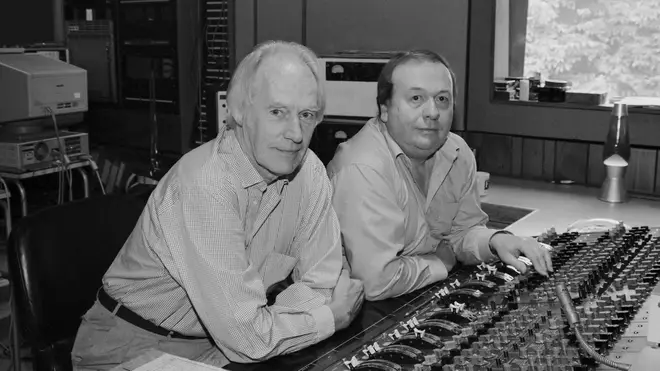
George apparently insisted that Jeff be along for the ride, while original Beatles engineer Geoff Emerick returned, joined by Jon Jacobs, who had worked with McCartney and Emerick since the late 1970s.
The Beatles went to Paul's home studio in Sussex in February and March 1994 to add their parts to Lennon's sparse vocal and piano demo.
"We just pretended that John had gone on holiday or out for tea and had left us the tape to play with," Ringo said. "That was the only way we could deal with it, and get over the hurdle, because it was really very emotional."
Who wrote 'Free as a Bird' and 'Real Love'?

Flying (Remastered 2009)
The original demo of 'Free as a Bird' was pretty sparse, and the rest of The Beatles added enough for the song to be formally credited to all four of the band: so it's Lennon-McCartney-Harrison-Starr.
While most of the band's music was written by the Lennon-McCartney partnership, with a healthy dollop of Harrisongs and a couple of Ringo tracks, a full-band writing credit wasn't completely unique.
'Flying' and 'Dig It' were credited to Lennon-McCartney-Harrison-Starr, as were the Anthology outtakes '12-Bar Original' and 'Los Paranoias'
When it came to 'Real Love' the song itself was pretty much already there, so it's listed as a John Lennon composition. Of course, had he been in The Beatles at the time, McCartney would have been given a co-write, but it wasn't, so he isn't.
Apparently, it was first written to be part of an unfinished stage play called The Ballad of John and Yoko, being turned into 'Real Life', with several failed attempts to record it in the studio, including for 1980's Double Fantasy album.
Who plays and sings on 'Free as a Bird' and 'Real Love'?

Jeff Lynne On His Relationship With The Beatles
Being built around John's demos, it's obviously his voice that leads both songs.
Back then in the pre-Get Back world, it wasn't possible to isolate Lennon's voice from the other sounds on the tape, so it's his piano you can hear on 'Free as a Bird'.
The song was cut up to give spots for Paul and George's vocals, while Harrison also added slide guitar and a ukulele coda over a backwards sample of John saying that old George Formby catchphrase "turned out nice again!".
On the full credits you've got Paul and George with lead and harmony vocals, with Paul adding bass, acoustic guitar, synthesizer and piano, with George adding slide guitar, acoustic guitar and ukulele.
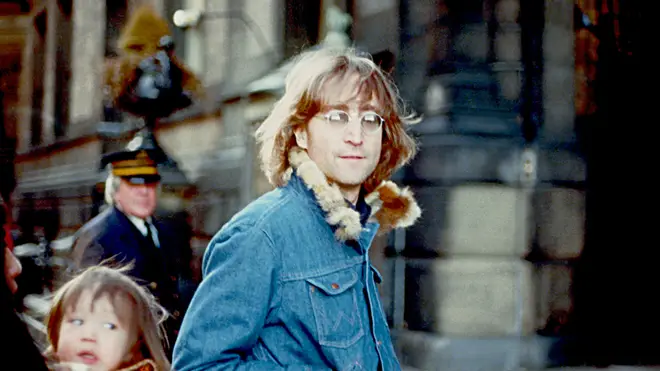
Ringo obviously added drums, and also backing vocals.
Taking a nod from George Martin, who appeared on many of his Beatles productions, Jeff Lynne wasn't shy about adding his own electric guitar and backing vocals.
Despite being more finished than 'Free As A Bird', in some ways polishing up the 'Real Love' demo – one made on a handheld tape recorder by John in July 1980 in Bermuda – was a tougher ask.
There was lots of hum and hiss on the tape, with plenty of clicks, and it took a lot of work to clean up the noise around Lennon's voice to have something workable.

John Lennon - Real Love (1979)
Then there were timing issues, as Lennon was just jotting an idea with the recording and not working to a drumbeat or metronome.
"It took a lot of work to get it all in time so that the others could play to it," Lynne told Sound on Sound." It's quite a complex process, but for some reason, I kind of know how to do it, through messing around on other stuff for years."
He added of the musical embellishments on both songs: "What we were trying to do was create a record that was timeless, so we steered away from using state-of-the-art gear. We didn't want to make it fashionable.
"It's just making the statement that they are all here playing together after all these years. So while it sounds fresh and new, it wouldn't have been out of place on The White Album."
On the finished version you've got John's original vocal and piano, with Paul, George, Ringo and Jeff adding backing vocals.

The Beatles - Real Love
Paul also plays acoustic guitar, piano, bass, double bass, harmonium, harpsichord and percussion, while George adds electric guitars, slide guitar, acoustic guitar and percussion.
Ringo, again, is on drums and percussion, while Jeff added a bit of guitar, too.
"It was very strange and it was very magic; it was spooky and it was very wonderful," McCartney told Bass Player.
"Before the session, we were talking about it, and I was trying to help set it up, because we never even knew if we could be in a room together after all these years.
"So I was talking to Ringo about how we'd do it, and he said that it might even be joyous. And it was - it was really cool.
"We pulled it off, that's the thing. And I don't care what anyone says. We could work together. We did a bit of technical stuff on the tape, to make it, to make it work, and Jeff Lynne was very good."
Were 'Free as a Bird' and 'Real Love' ever released before?

Imagine: John Lennon - Theatrical Trailer
While Lennon's demos had circulated on bootlegs, 'Free as a Bird' had never been officially released in any form before The Beatles reunited to work on it.
A different October 1979 demo of 'Real Love', this one featuring John on acoustic guitar rather than piano, had been properly available before, as it opened the 1988 documentary soundtrack for Imagine: John Lennon.
When did The Beatles release 'Free as a Bird' and 'Real Love' and where did they get in the charts?
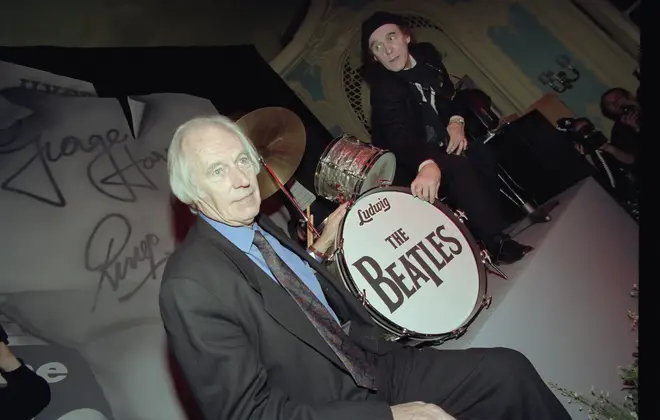
'Free As A Bird' was released as a single on December 4, 1995, backed with with 'Christmas Time (Is Here Again)' – with the CD also including takes of 'I saw Her Standing There' and 'This Boy'.
It eventually peaked at number 2 in the UK singles chart, only being kept off the top by Michael Jackson's all-conquering 'Earth Song'.
That was despite many Beatles fans already buying Anthology 1 a fortnight earlier, with the album opening with the track.
A stunning music video for 'Free As A Bird' was directed by Joe Pytka (famous for directing Space Jam and a load of Michael Jackson videos), which took a literal bird's-eye view of The Beatles story, with nods to countless Beatles songs and moments, including the likes of 'Penny Lane', 'A Day in the Life', 'Helter Skelter', 'Piggies' "Eleanor Rigby', 'Strawberry Fields Forever' and many, many more.

The Beatles - Christmas Time (Is Here Again) (Free as a Bird Single Version)
'Real Love' was released as a single on March 4, 1996, a fortnight before Anthology 2, which it opened.
That compilation also included previously-unreleased Beatles songs '12-Bar Original', originally slated for Rubber Soul, as well as 'If You've Got Trouble' and 'That Means a Lot', which had been planned for Help! before being dropped.
Anthology 2 topped the charts, while the 'Real Love' single peaked at number 4 despite missing out on the then-all-important Radio 1 playlist. It also reached 11 in the US.
The video for 'Real Love' was a bit more trad than that for 'Free As A Bird', a fly-on-the-wall affair directed by Anthology's Geoff Wonfor and 10cc's Kevin Godley.
Have 'Free as a Bird' and 'Real Love' been remixed, and will they be remixed again?

TheBeatles1 BluRayDVD trailer
The use of new tech to build 'Now and Then' has led to clamours for a remixed and remastered 'Free as a Bird' and 'Real Love'.
WIth their 30th anniversaries coming up that's a very real possibility, though it's worth noting that both 'Free As A Bird' and 'Real Love' were significantly remixed by Lynne with Giles Martin for the 1+ deluxe edition hits album as well as the accompanying DVD and Blu-rays.
As well as cleaning up John's vocals, 'Free As A Bird' switched up takes of George's vocals ("whatever happened to the life that we once knew" became "whatever happened to the love that we once knew") and bumped up Macca's lead vocal in the second verse, while the Formby catchphrase is played forwards instead of backwards.
The remade 'Real Love', faded up the harpsichord and harmonium, and even zapped some lead guitar bits and drum fills from the 1995 recording.
Why did 'Now and Then' get abandoned after 'Free as a Bird' and 'Real Love' were completed?

Grow Old With Me (Remastered 2010)
The plan was very much for a third "new" recording to open Anthology 3, but on the finished CD instead opened with George Martin's 'A Beginning' instrumental, first recorded for (but not used on) The White Album, and instead featured on Yellow Submarine instead.
So what happened? It turns out that The Beatles had in fact started work on another of those Lennon demos in February 1995 – before they even started on 'Real Love'.

A Beginning (Anthology 3 Version)
While some thought it was 'Grow Old With Me' – which was first officially released a decade before Anthology – the demo in question is now believed to have been 'Now and Then' (or 'Miss You'), recorded by Lennon at the Dakota the year before he died.
"We did start work on it, but it was obviously unfinished from a writing point of view, so we thought, we'd work on 'Real Love' which had a complete set of words," Lynne said.

Now and Then- John Lennon (ORIGINAL piano demo)
"It'll need to be completed as a song before everybody decides what to do with it, an it's not hard to imagine who would finish writing it."
Paul said in 2012: "There was another one that we started working on, but George went off it... that one's still lingering around, so I'm going to nick in with Jeff and do it. Finish it, one of these days."
And in June 2023, Paul revealed that AI had been used to isolate Lennon's vocals – just like Peter Jackson did for the Get Back project and he had done for his "duet" with the late John.
"He [Jackson] was able to extricate John's voice from a ropey little bit of cassette," Sir Paul. "We had John's voice and a piano and he could separate them with AI. They tell the machine, 'That's the voice. This is a guitar. Lose the guitar'.

The Beatles - Now And Then (Official Audio)
"So when we came to make what will be the last Beatles' record, it was a demo that John had [and] we were able to take John's voice and get it pure through this AI. Then we can mix the record, as you would normally do. So it gives you some sort of leeway."
All that meant Pau and Ringo could finally finish off the song and release 'Now and Then', the "last Beatles song" – until they finally put out 'Carnival of Light', but that's another story for another time.
